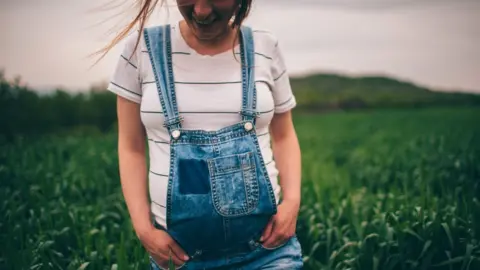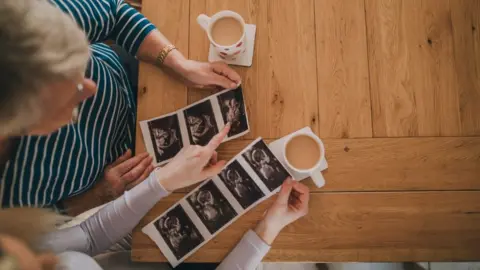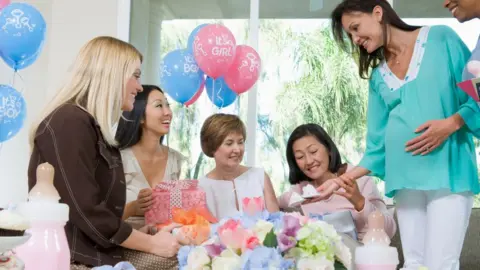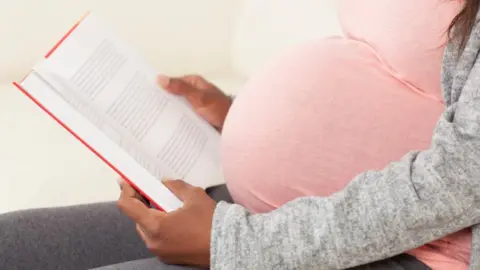The silence of stillbirth
 Getty Images
Getty ImagesIt's six weeks after your due date and you reach the front of the long coffee queue at work.
"Oh my goodness! You're back! What did you have?"
Silence.
What I had was a baby girl stillborn at 38 weeks.
In the last few weeks I had given birth to a baby I knew was already dead (in a hospital, surrounded by the screams of newborn babies) and organised and attended her funeral.
But people don't talk about stillbirth, so the girl who has made your coffee for the past five years doesn't know.
 Getty Images
Getty ImagesWhat do you do at the front of that line, when a thoroughly good human being has asked you a question to which there is no answer that will not make her feel like the worst person on earth?
I felt physically sick. I could feel my eyes burning.
"I can't talk about this just now. I'll talk to you later," I said, and walked away from a whole queue of people left wondering what on earth had happened to me.
Three years on, I still don't really talk about stillbirth very much. It's painful not just for me, but everyone around me.
Another scenario: you are at a baby shower for a friend who is about to have her first baby.
 Getty Images
Getty ImagesAll the other women tell their childbirth stories, good and bad.
I say nothing. No pregnant woman wants to contemplate what happened to my daughter happening to their child.
What happened to me happening to them.
So the silence continues. I edit my life story so as not to frighten others.
Deep down though, I know this silence about stillbirth - all these silences about stillbirth - are part of the reason that every day in the UK, 15 babies are stillborn and 15 families DO go through what I've been through.
 Getty Images
Getty ImagesSo as part of this awareness month, I am talking about stillbirth. The good and the bad.
The good? How can there be good in a stillbirth?
Firstly there's the kindness of others - and especially others with a silent grief.
There are countless men and women out there who carry with them a burden of early pregnancy loss or the death of a child that people don't know about - or the inability to have a child in the first place.
Their quiet whispering of 'I know a bit of what you are going through' was gentle and human and warm.
But the process of losing my daughter has also given me something like a superpower.
 kieferpix
kieferpixThere's something very liberating about knowing that you have survived this horrible event.
I don't worry about losing my job - I've lost my child.
I never worry about the day ahead, because I remember waking up on the day when I had to drag my heavily pregnant body into hospital and give birth in extreme emotional and therefore physical pain.
To hold my dead baby, while in the room next door a family was celebrating their live one.
So throw any kind of every day stress at me and it bounces off.
Different life
Deep down of course there is pain.
Grace had Down's Syndrome.
We knew that from around 14 weeks and faced a lot of pressure to terminate but that is not really how my heart is set up.
So I actually knew more about how her life would have been than most expectant parents and I'd given up almost every bit of work I had in preparation to care for her.
These were not easy choices, and I won't pretend they were, but I'd adjusted to them in my head and my heart and I was ready to be someone different.
Someone, frankly, better.
The loss of Grace took that different life from me.
There I was, back at work, in the coffee queue - no longer having to worry about how my special needs child would be treated by the world, whether we'd be stared at on holiday.
And do you know what?
I'm now the woman who stares at the kids with Down's Syndrome in the soft play or at the beach, but obviously for very different reasons.
 the_renderfish
the_renderfishI was at a spa last month and a girl with Down's Syndrome I didn't know at all came running across and hugged me.
Her mother was so apologetic as I just stood there with big smile on my face and tears in my eyes.
"She's fine," I said. "In fact she's just what I needed!"
That mum will never know what happened to me, or why that hug meant so much.
And again, that's the silence of stillbirth.
You carry with you being 'different', behaving 'differently' - but many of the people you work with or become friends with through your other children, will never know why.
No-one knows why Grace died.
The post-mortem couldn't find anything concrete.
She had Down's Syndrome but her heart was perfect with none of the defects associated with the condition.
I'd been having weekly scans so she was definitely not neglected by the NHS.
Between the scan at the 37 weeks and the scan at 38 weeks, she died without ever seeing the world, or me her mother.
I'll never know why it happened in medical terms, and the question 'why me?' goes through my head every day.
We've got to create a world where women - and wider families - aren't expected to be silent about such a catastrophic event happening to them, because it is contributing to the problem not going away.
Health baby boy
When women know that this is a reality, they can feel more empowered to turn up to that maternity hospital if they even have the slightest inkling that something is wrong.
To not care about the glances from medical staff that say "she's just neurotic".
When the outcome I am living with is the other option, please - be as neurotic as you like.
Print this out and take it with you. Ask them how they'd feel at the baby shower or at the front of that coffee queue.
I've just survived another pregnancy - barely - and given birth to a beautiful healthy baby boy.
He'll never replace Grace, but he's the sort of happy ending that should come at the end of every pregnancy and with more research and greater awareness we can make sure that is the case.
